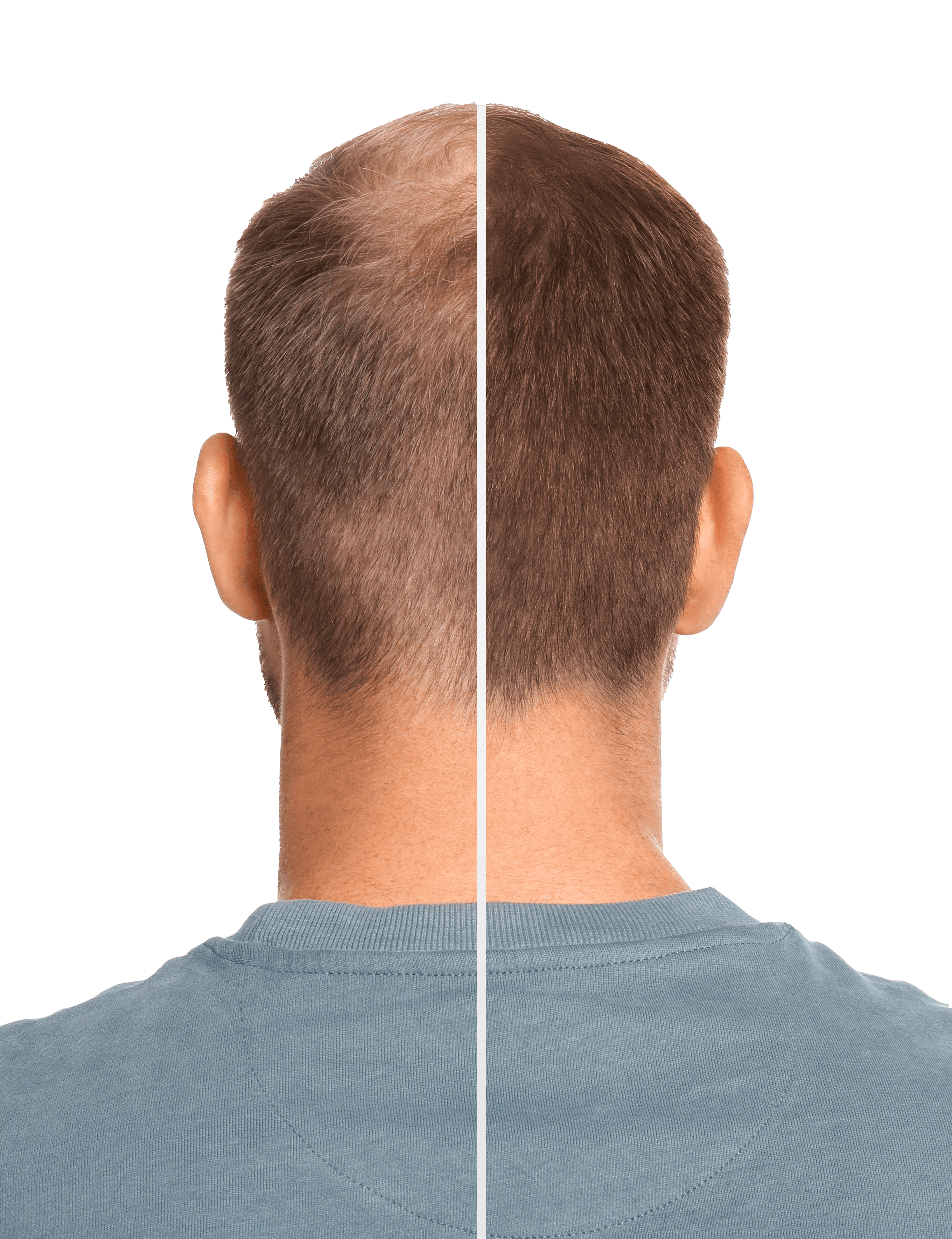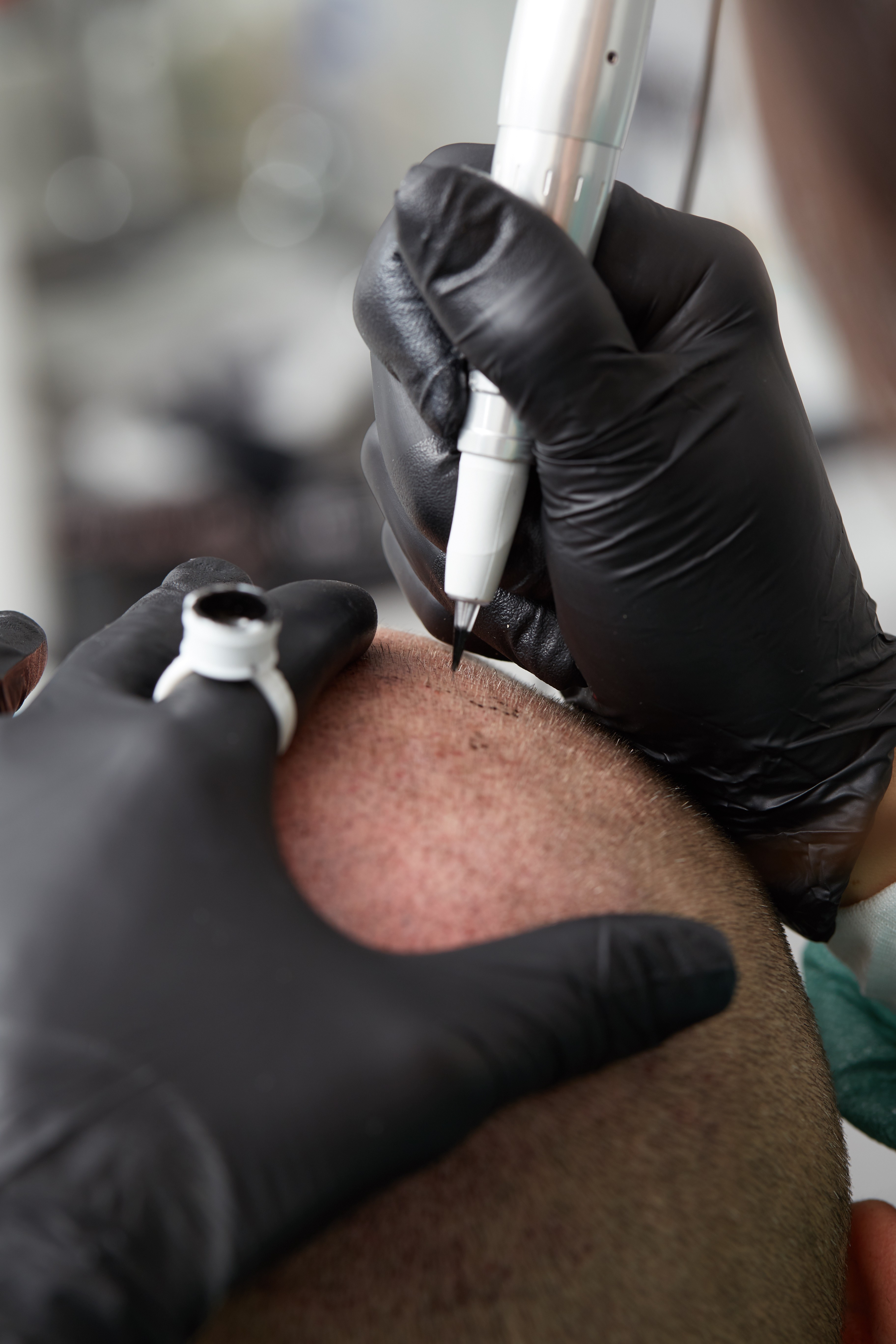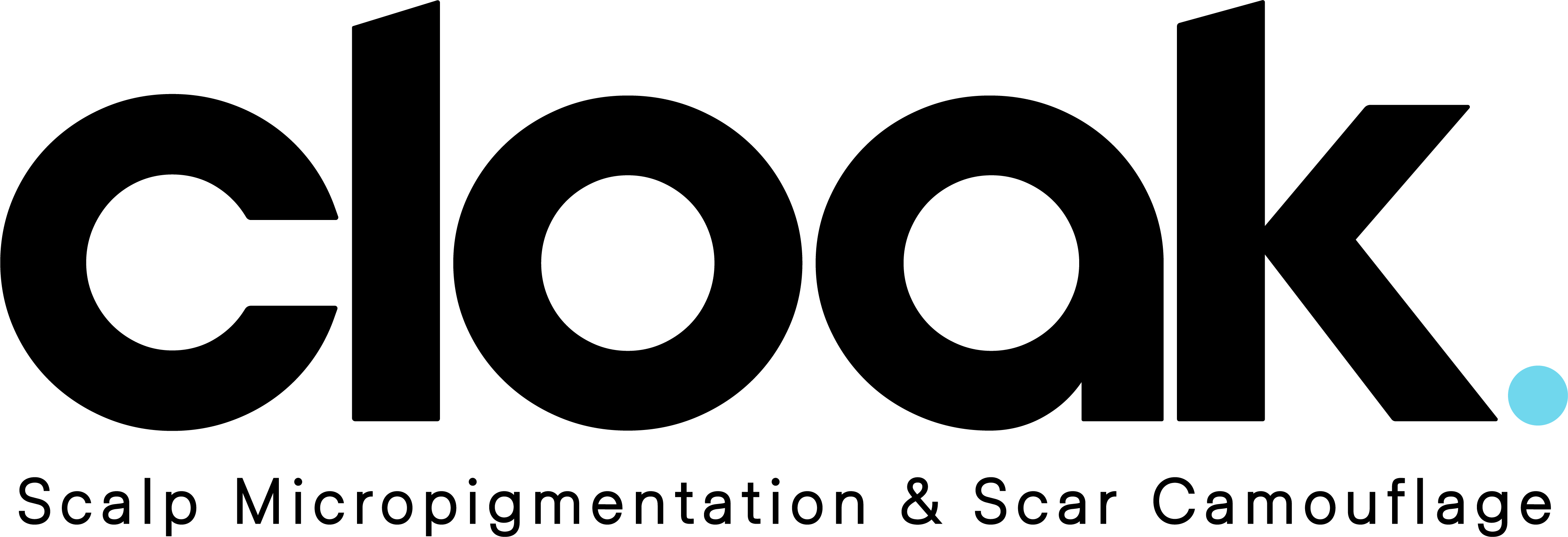Scalp micropigmentation (SMP) is a versatile, non-surgical treatment that addresses a variety of hair loss conditions by replicating the appearance of hair follicles on the scalp.
One of the primary conditions SMP treats is male and female pattern baldness (androgenetic alopecia). This condition is characterized by progressive hair thinning, which can leave visible areas of the scalp exposed. SMP creates the illusion of a fuller head of hair by tattooing tiny dots that mimic natural hair follicles, providing the appearance of a closely shaved or buzzed hairstyle.
Another significant application of SMP is for individuals who experience scarring on the scalp, either from surgical procedures, such as hair transplants or trauma. Scars can be particularly noticeable because hair doesn't grow in these areas. SMP helps blend the scar tissue with the surrounding hair, making the scars much less visible and giving a more uniform look to the scalp.
SMP can also benefit those with alopecia areata or other autoimmune disorders that cause patchy hair loss. By simulating hair follicles in these bald patches, SMP can restore a more consistent appearance across the scalp.
Additionally, individuals with thinning hair can use SMP to give the illusion of greater hair density, making the scalp less visible through the thinning strands, and enhancing the overall look of volume and fullness.
What can SMP treat?

What is Scalp Micropigmentation?
Scalp Micropigmentation (SMP) is a non-surgical cosmetic procedure that involves the precise tattooing of small, pigmented dots on the scalp to replicate the appearance of natural hair follicles. This technique is designed to create the illusion of a closely shaved hairstyle or to cover areas of hair loss, providing a solution that is both realistic and enduring.
SMP is an excellent option for individuals seeking a low-maintenance, long-lasting solution to address thinning hair, bald spots, or conditions such as alopecia. It effectively enhances the overall look by giving the appearance of thicker, fuller hair, restoring confidence and achieving a well-groomed aesthetic. The treatment is suitable for people of all ages and hair types, and it offers a versatile approach to managing various degrees of hair loss.
What is Scalp Micropigmentation?
Scalp Micropigmentation (SMP) is a non-surgical cosmetic procedure that involves the precise tattooing of small, pigmented dots on the scalp to replicate the appearance of natural hair follicles. This technique is designed to create the illusion of a closely shaved hairstyle or to cover areas of hair loss, providing a solution that is both realistic and enduring.
SMP is an excellent option for individuals seeking a low-maintenance, long-lasting solution to address thinning hair, bald spots, or conditions such as alopecia. It effectively enhances the overall look by giving the appearance of thicker, fuller hair, restoring confidence and achieving a well-groomed aesthetic. The treatment is suitable for people of all ages and hair types, and it offers a versatile approach to managing various degrees of hair loss.


How Is Scalp
Micropigmentation (SMP) Done?
Scalp Micropigmentation (SMP) is a meticulous process designed to replicate the appearance of natural hair follicles and restore the look of a full, healthy hairline. The journey begins with a consultation where your goals and hair loss patterns are discussed in detail. This step allows for the creation of a personalized treatment plan tailored to your unique needs.
The procedure typically requires 2-3 sessions, spaced out to allow for proper layering and adjustments. Before starting, the treatment area is carefully mapped to define the specific sections to be treated, ensuring precision and alignment with your desired outcome. Pigments are then color-matched to your natural hair color and skin tone for a seamless, realistic finish.
Preparation is key to achieving optimal results. For most clients, the head is shaved to create a smooth surface (women do not need to shave their heads). The scalp is cleaned and prepared for the treatment. Using a tattoo machine and sterile, single-use needles, tiny, layered pigment dots are meticulously deposited into the scalp to mimic the look of natural hair follicles.
Each session builds on the previous one, with layering and detailing used to gradually create density, texture, and shading for a realistic result. After the procedure, following aftercare instructions is crucial to ensure proper healing and pigment retention.
SMP is a transformative solution that restores the appearance of a full head of hair, offering a renewed sense of confidence and a low-maintenance, long-lasting result.
Pre-Care.
Avoid Blood Thinners: Refrain from taking aspirin, ibuprofen, or other blood-thinning medications at least 48 hours before your appointment, as they can increase bleeding. Avoid alcohol and caffeine for 24 hours prior as well.
Stay Hydrated: Drink plenty of water in the days leading up to your session to keep your skin hydrated, which helps with pigment retention.
Avoid Hair Products: Do not use any styling products like gels, sprays, or oils on your scalp on the day of the treatment.
Shave the Area (if needed): If your SMP treatment requires a shaved scalp, shave the area 24 hours before your appointment to ensure a smooth surface. Women and those receiving density treatments do not need to shave their heads.
Protect Your Scalp: Avoid excessive sun exposure, tanning beds, or sunburns for at least 3-5 days before your session. Sun-damaged skin may not respond well to the treatment.
Wash Your Scalp: Thoroughly clean your scalp on the morning of your appointment to remove any dirt, oil, or residue. Use a mild, fragrance-free cleanser for best results.
Avoid Chemical Treatments: Refrain from using any chemical treatments on your scalp, such as hair dye or perms, for at least a week before your session.
Eat Beforehand: Have a light meal before your session to avoid feeling lightheaded or uncomfortable during the procedure.
Aftercare.
Avoid Touching the Treated Area: Refrain from touching, scratching, or picking at the treated scalp for the first few days to prevent infection and ensure proper healing.
Avoid Hair Products: Do not apply hair products like gels, sprays, or oils to the treated area for at least 7-10 days to allow the skin to heal properly without interference from chemicals.
Avoid Moisture: Do not wet the treated area for at least 4 days. This includes avoiding sweating, swimming, and activities that cause excess moisture.
Limit Physical Activity: Avoid heavy exercise, saunas, or hot tubs for at least a week post-procedure, as excessive sweating can affect the results.
No Sun Exposure: Stay out of the sun for at least 10-14 days to prevent fading and irritation. After this period, always wear a hat or sunscreen when exposed to the sun.
Avoid Shaving or Scraping: Do not shave or scrape the treated area for 7-10 days to allow the pigment to fully set into the skin.
Be Patient During Healing: Expect some slight redness or swelling in the first few days, and remember that the pigments may appear darker immediately after the session but will fade to the final shade after healing.
Gentle Moisturization: After the initial healing period, apply a fragrance-free moisturizer to keep the skin hydrated.
Scalp Micropigmentation (SMP) is ideal for individuals with hair loss, thinning, or receding hairlines, including those with pattern baldness, alopecia, or scarring from hair transplants. It can add density to thinning areas or create a defined hairline, offering a non-invasive, customizable solution. SMP works for both men and women, and the results can look incredibly natural, closely mimicking the appearance of real hair follicles.
SMP is best suited for those in good health with realistic expectations. It may not be suitable for individuals with active scalp conditions like severe eczema or psoriasis. For those seeking a long-lasting, low-maintenance option without the need for ongoing treatments, SMP offers an effective solution. Whether you're looking to restore your hairline or simply add density, SMP can help you regain confidence and improve your overall appearance.
Who's A Good Candidate For SMP?


How Is Scalp Micropigmentation (SMP) Done?
Scalp Micropigmentation (SMP) is a meticulous process designed to replicate the appearance of natural hair follicles and restore the look of a full, healthy hairline. The journey begins with a consultation where your goals and hair loss patterns are discussed in detail. This step allows for the creation of a personalized treatment plan tailored to your unique needs.
The procedure typically requires 2-3 sessions, spaced out to allow for proper layering and adjustments. Before starting, the treatment area is carefully mapped to define the specific sections to be treated, ensuring precision and alignment with your desired outcome. Pigments are then color-matched to your natural hair color and skin tone for a seamless, realistic finish.
Preparation is key to achieving optimal results. For most clients, the head is shaved to create a smooth surface (women do not need to shave their heads). The scalp is cleaned and prepared for the treatment. Using a tattoo machine and sterile, single-use needles, tiny, layered pigment dots are meticulously deposited into the scalp to mimic the look of natural hair follicles.
Each session builds on the previous one, with layering and detailing used to gradually create density, texture, and shading for a realistic result. After the procedure, following aftercare instructions is crucial to ensure proper healing and pigment retention.
SMP is a transformative solution that restores the appearance of a full head of hair, offering a renewed sense of confidence and a low-maintenance, long-lasting result.
Pre-Care.
Avoid Blood Thinners: For at least 48 hours before your session, refrain from using blood thinners such as aspirin, ibuprofen, or alcohol, as they can increase the risk of bleeding and affect the healing process.
Shave the Scalp (if needed): If you're having SMP on a shaved scalp, ensure it's clean-shaven on the day of the procedure. Women do not need to shave their heads, but any existing hair may need to be trimmed for optimal results.
Avoid Sun Exposure: Try to avoid direct sun exposure for a few days prior to your session to prevent skin irritation or sunburn, which could impact the procedure.
Stay Hydrated: Drink plenty of water before your session to ensure your skin is well-hydrated, which can help with pigment retention.
Wash Your Scalp: On the day of the procedure, wash your scalp thoroughly to remove any oils, dirt, or styling products to ensure the treatment area is clean.
Prepare for Comfort: If you're concerned about discomfort, you can discuss numbing options with your technician before the appointment, though the procedure is generally well-tolerated.
Aftercare.
Avoid Touching the Treated Area: Refrain from touching, scratching, or picking at the treated scalp for the first few days to prevent infection and ensure proper healing.
Avoid Hair Products: Do not apply hair products like gels, sprays, or oils to the treated area for at least 7-10 days to allow the skin to heal properly without interference from chemicals.
Avoid Moisture: Do not wet the treated area for at least 4 days. This includes avoiding sweating, swimming, and activities that cause excess moisture.
Limit Physical Activity: Avoid heavy exercise, saunas, or hot tubs for at least a week post-procedure, as excessive sweating can affect the results.
No Sun Exposure: Stay out of the sun for at least 10-14 days to prevent fading and irritation. After this period, always wear a hat or sunscreen when exposed to the sun.
Avoid Shaving or Scraping: Do not shave or scrape the treated area for 7-10 days to allow the pigment to fully set into the skin.
Be Patient During Healing: Expect some slight redness or swelling in the first few days, and remember that the pigments may appear darker immediately after the session but will fade to the final shade after healing.
Gentle Moisturization: After the initial healing period, apply a fragrance-free moisturizer to keep the skin hydrated.
Who Is a Good Candidate for Scalp Micropigmentation?
Scalp Micropigmentation (SMP) is ideal for individuals with hair loss, thinning, or receding hairlines, including those with pattern baldness, alopecia, or scarring from hair transplants. It can add density to thinning areas or create a defined hairline, offering a non-invasive, customizable solution. SMP works for both men and women, and the results can look incredibly natural, closely mimicking the appearance of real hair follicles.
SMP is best suited for those in good health with realistic expectations. It may not be suitable for individuals with active scalp conditions like severe eczema or psoriasis. For those seeking a long-lasting, low-maintenance option without the need for ongoing treatments, SMP offers an effective solution. Whether you're looking to restore your hairline or simply add density, SMP can help you regain confidence and improve your overall appearance.

What can Scalp Micropigmentation treat?
Scalp Micropigmentation (SMP) is a versatile and effective cosmetic procedure designed to address a wide range of hair-related concerns. Here are the primary issues that SMP can treat, along with the benefits it provides:
Thinning Hair
For those suffering from thinning hair, SMP can significantly enhance the appearance of density and fullness. The pigmented dots blend seamlessly with existing hair, creating the illusion of thicker hair without the need for extensions or other temporary solutions. This can boost confidence and improve overall appearance.
Alopecia
Alopecia, including alopecia areata, totalis, and universalis, causes patchy or complete hair loss on the scalp and body. SMP effectively covers these patches, providing a consistent, natural-looking hairline and scalp coverage. This can be particularly beneficial for individuals who have struggled with the emotional and psychological impacts of alopecia.
Scars
Scars on the scalp from injuries, surgeries (such as hair transplants), or other medical procedures can be effectively camouflaged with SMP. The pigmentation matches the surrounding hair follicles, making scars much less noticeable. This allows for a more uniform and aesthetically pleasing appearance.
Receding Hairlines
Men and women experiencing a receding hairline can benefit from SMP by having their hairline restored to its original position or designed into a more aesthetically pleasing shape. This can rejuvenate the appearance, providing a youthful and refreshed look.
Female Pattern Baldness
SMP is ideal for women with pattern baldness as it effectively conceals thinning areas, creating the appearance of denser hair. It provides a non-invasive, long-lasting solution to restore confidence without the need for surgery.
Enhancing Hair Transplants
SMP can complement hair transplant procedures by adding the appearance of density between transplanted hair follicles, providing a fuller look. It can also cover any areas that may not have taken as well to the transplant, ensuring a more uniform result.
Post-Chemotherapy Hair Loss
Patients who have experienced hair loss due to chemotherapy can use SMP to restore the appearance of hair on the scalp. This can be a significant boost to self-esteem and confidence during recovery, providing a sense of normalcy and well-being.
Scalp Disorders
Scalp Disorders
Individuals with certain scalp disorders that result in hair loss, such as lichen planopilaris or frontal fibrosing alopecia, can benefit from SMP. The procedure covers affected areas and creates a more uniform and natural appearance, improving the overall look of the scalp.
Cosmetic Enhancements
Individuals with certain scalp disorders that result in hair loss, such as lichen planopilaris or frontal fibrosing alopecia, can benefit from SMP. The procedure covers affected areas and creates a more uniform and natural appearance, improving the overall look of the scalp.
Baldness
SMP is a highly effective solution for individuals experiencing complete or partial baldness. By meticulously applying tiny, pigmented dots to the scalp, SMP creates the illusion of a full head of hair that has been closely shaved. This look is both stylish and low-maintenance, offering a permanent solution to hair loss.
Benefits of SMP.
Scalp Micropigmentation (SMP) offers numerous benefits, making it an attractive solution for those dealing with hair loss and related concerns. One of the primary advantages is that it is a non-surgical procedure, eliminating the need for incisions or sutures and resulting in a scar-free treatment. This makes the recovery process quick and straightforward, with minimal downtime. SMP provides immediate results, giving the appearance of a full head of closely-shaved hair or increased hair density right after the procedure. The treatment is also long-lasting, with results that can endure for several years with proper care, reducing the need for frequent maintenance. Additionally, SMP is versatile and suitable for all skin tones and hair types, allowing for personalized treatment plans tailored to each individual's needs. It is a low-maintenance solution that requires no special hair products or daily styling, making it a convenient option for those seeking a hassle-free way to improve their appearance. Overall, SMP effectively restores confidence and provides a natural, aesthetically pleasing look, making it a popular choice for many.

Benefits Of SMP
Scalp Micropigmentation (SMP) offers numerous benefits, making it an attractive solution for those dealing with hair loss and related concerns. One of the primary advantages is that it is a non-surgical procedure, eliminating the need for incisions or sutures and resulting in a scar-free treatment. This makes the recovery process quick and straightforward, with minimal downtime.
SMP provides immediate results, giving the appearance of a full head of closely-shaved hair or increased hair density right after the procedure. The treatment is also long-lasting, with results that can endure for several years with proper care, reducing the need for frequent maintenance. Additionally, SMP is versatile and suitable for all skin tones and hair types, allowing for personalized treatment plans tailored to each individual's needs.
It is a low-maintenance solution that requires no special hair products or daily styling, making it a convenient option for those seeking a hassle-free way to improve their appearance. Overall, SMP effectively restores confidence and provides a natural, aesthetically pleasing look, making it a popular choice for many.








